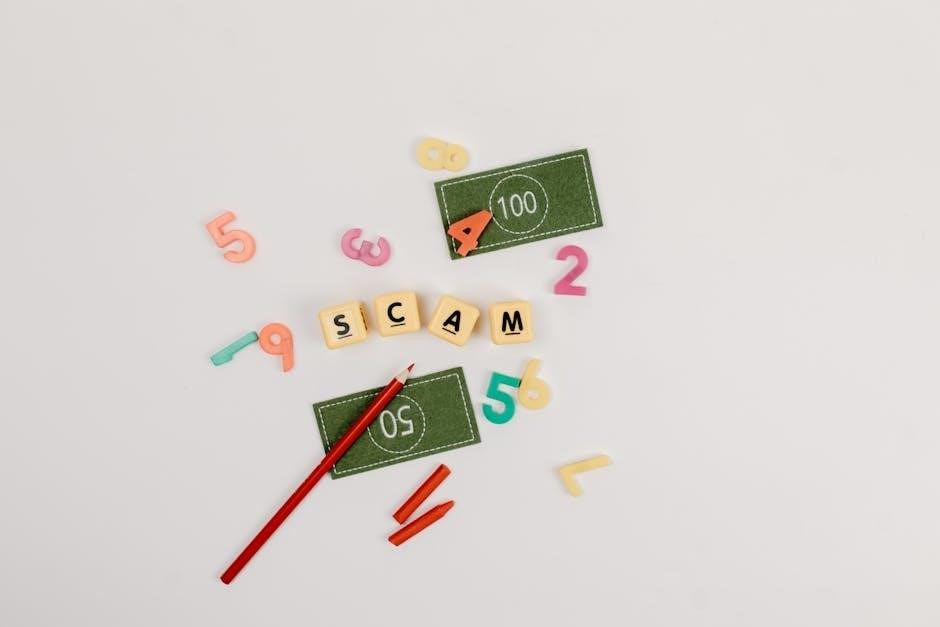Mathematical puzzles are engaging brain teasers that challenge logical thinking and problem-solving skills. Available in PDF formats‚ they offer fun‚ educational activities for all age groups‚ fostering mathematical understanding and creativity while providing entertainment for both kids and adults.
What Are Mathematical Puzzles?
Mathematical puzzles are engaging brain teasers that challenge logical thinking and problem-solving skills. They are designed to test cognitive abilities and encourage creative approaches to mathematics. Available in various formats‚ including PDF‚ these puzzles cater to diverse age groups‚ from children in grades 1-7 to adults. They cover a wide range of math topics‚ such as arithmetic‚ algebra‚ and geometry‚ making them both educational and entertaining. Many puzzles are designed to be fun activities‚ fostering a deeper understanding of mathematical concepts while providing enjoyment. Whether solving missing numbers‚ logical riddles‚ or visual challenges‚ mathematical puzzles offer a unique way to engage with mathematics and sharpen mental acuity. Their versatility and accessibility make them a popular choice for learners of all levels.
The Importance of Mathematical Puzzles
Mathematical puzzles are instrumental in fostering cognitive development and enhancing problem-solving abilities. They encourage logical thinking‚ creativity‚ and analytical reasoning‚ making them invaluable for learners of all ages. By engaging with these puzzles‚ individuals can improve their mathematical understanding and build confidence in tackling complex problems. Moreover‚ puzzles like those found in PDF collections provide a fun and interactive way to learn‚ making mathematics accessible and enjoyable. They also serve as a tool for educators to create engaging lesson plans‚ promoting active learning and fostering a deeper appreciation for the subject. The importance of mathematical puzzles lies in their ability to transform learning into an enjoyable and intellectually stimulating experience‚ benefiting both academic and personal growth.
A Brief History of Mathematical Puzzles
Mathematical puzzles have a rich and diverse history that spans thousands of years‚ with early examples found in ancient civilizations. These puzzles often emerged as intellectual challenges‚ testing logical reasoning and problem-solving skills. The history of mathematics is intertwined with recreational puzzles‚ as they were used to explore mathematical concepts and spark curiosity. In the Middle Ages‚ puzzles became popular in Europe‚ with many appearing in manuscripts and books. The 19th and 20th centuries saw a surge in popularity‚ with figures like Martin Gardner popularizing mathematical puzzles through books and magazines. Today‚ puzzles are widely available in PDF collections‚ making them accessible to a global audience and ensuring their legacy continues to inspire future generations.

Types of Mathematical Puzzles
Mathematical puzzles come in various forms‚ including logical‚ arithmetic‚ algebraic‚ and geometric challenges. They are widely available in PDF collections‚ offering diverse problem-solving experiences for all skill levels and ages.
Logical Puzzles
Logical puzzles are brain teasers that require reasoning‚ problem-solving‚ and critical thinking. They often involve numbers‚ patterns‚ or riddles‚ challenging individuals to deduce solutions through systematic analysis. These puzzles are widely available in mathematical puzzles PDF collections‚ offering a variety of challenges for different skill levels. Unlike arithmetic or algebraic puzzles‚ logical puzzles focus on understanding relationships and sequences rather than computational skills. They are ideal for improving cognitive abilities such as attention‚ memory‚ and analytical thinking. Examples include Sudoku‚ logic grids‚ and number sequence problems. Solving logical puzzles can enhance mental agility and provide a sense of accomplishment‚ making them a popular choice for both casual and serious problem solvers.
Arithmetic Puzzles
Arithmetic puzzles are engaging challenges that focus on basic mathematical operations like addition‚ subtraction‚ multiplication‚ and division. These puzzles are often presented in a fun‚ problem-solving format‚ making them accessible to learners of all ages. They are widely available in mathematical puzzles PDF collections‚ offering a variety of exercises to sharpen numerical skills. Examples include mental math challenges‚ number sequences‚ and calculation-based riddles. Solving arithmetic puzzles helps improve speed‚ accuracy‚ and confidence in handling everyday math tasks. They are particularly useful for students‚ providing a enjoyable way to practice foundational arithmetic concepts. Resources like BrainDen and Math Goodies offer extensive PDF collections tailored for different skill levels‚ ensuring there’s something for everyone to enjoy and learn from.
Algebraic Puzzles
Algebraic puzzles are mathematical challenges that involve solving equations‚ manipulating variables‚ and applying algebraic principles. These puzzles often require logical thinking and problem-solving skills to uncover hidden values or relationships. Many mathematical puzzles PDF resources include algebraic puzzles‚ offering exercises for learners to practice and master algebraic concepts. Examples range from simple linear equations to complex systems of equations. Solving these puzzles enhances analytical reasoning and prepares individuals for advanced mathematical studies. Popular platforms like Brilliant and Math Open Reference provide downloadable PDFs with a variety of algebraic puzzles‚ catering to both beginners and advanced problem solvers. These resources make learning algebra engaging and accessible for everyone.
Geometric Puzzles
Geometric puzzles challenge problem solvers to use spatial reasoning and geometric principles to find solutions. These puzzles often involve shapes‚ angles‚ and spatial relationships. Examples include tangram puzzles‚ where players arrange triangles to form specific shapes‚ and geometric Sudoku‚ which combines number placement with geometric constraints. Many mathematical puzzles PDF collections feature geometric puzzles‚ offering exercises to improve visual and spatial thinking. These puzzles are both educational and entertaining‚ helping learners understand geometric concepts in an engaging way. Resources like “Geometric Puzzles for Beginners” and “Advanced Geometry Challenges” provide diverse exercises suitable for all skill levels. Solving these puzzles enhances creativity and problem-solving abilities while fostering a deeper appreciation for geometry.
Benefits of Solving Mathematical Puzzles
Solving mathematical puzzles enhances mental agility‚ boosts analytical thinking‚ and improves problem-solving strategies. Mathematical puzzles PDF resources offer diverse challenges that sharpen logical reasoning and mathematical proficiency.
Cognitive Development
Solving mathematical puzzles significantly enhances cognitive development by improving memory‚ concentration‚ and logical reasoning. Mathematical puzzles PDF resources provide structured challenges that stimulate the brain‚ fostering neural connections and mental clarity. Engaging with these puzzles regularly strengthens problem-solving abilities and boosts critical thinking. They also enhance spatial awareness and visual processing‚ particularly in geometric and logic-based puzzles. For children‚ these activities lay a strong foundation for mathematical understanding and analytical skills. Adults benefit too‚ as puzzles help maintain cognitive health and prevent mental decline. The structured nature of these puzzles ensures consistent mental exercise‚ making them an invaluable tool for lifelong cognitive development across all age groups.
Problem-Solving Skills
Educational Value
Stress Relief and Fun
Solving mathematical puzzles can serve as a refreshing escape from daily stress‚ offering both relaxation and enjoyment. Engaging with puzzles like Sudoku‚ crosswords‚ or logic grids provides a mental workout while being fun and rewarding. These activities allow individuals to unwind and challenge their minds in a positive way‚ fostering a sense of accomplishment with each solved problem. Mathematical puzzles PDF collections often include a variety of games and brain teasers‚ catering to different interests and skill levels. Whether solving alone or competing with friends‚ these puzzles bring entertainment and intellectual stimulation‚ making them a great way to balance mental health and leisure time. They also encourage creativity and provide a sense of fulfillment‚ turning problem-solving into a delightful experience.

How to Solve Mathematical Puzzles
Solving mathematical puzzles requires logic‚ creativity‚ and patience. Start by understanding the problem‚ break it down‚ and apply known formulas or patterns. Practice regularly to improve skills and learn from mistakes. Accessing resources like mathematical puzzles PDFs and online tutorials can provide guidance and enhance problem-solving techniques effectively.
Basic Tips for Beginners
Starting with mathematical puzzles can be intimidating‚ but with the right approach‚ anyone can enjoy them. Begin by selecting puzzles that match your skill level and interests. Always read the problem carefully and ensure you understand what is being asked. Break down complex puzzles into smaller‚ manageable parts. Use resources like mathematical puzzles PDFs‚ which often include step-by-step solutions and explanations. Practice regularly to build familiarity with different types of puzzles. Don’t hesitate to use a calculator or draw diagrams to visualize the problem. Check your work as you go to catch mistakes early. Most importantly‚ stay patient and persistent—mathematical puzzles are meant to challenge and entertain!

Common Mistakes to Avoid
Avoiding common mistakes is crucial for successfully solving mathematical puzzles. One frequent error is rushing through problems without fully understanding them. Always take time to read and comprehend the puzzle before attempting a solution. Another mistake is failing to break down complex puzzles into simpler parts‚ which can lead to confusion. Neglecting to verify each step can result in overlooked errors. Overcomplicating solutions is also a pitfall; sometimes‚ the simplest approach is correct. Additionally‚ many learners overlook the value of using resources like mathematical puzzles PDFs‚ which often highlight common errors and provide clear solutions. By being mindful of these mistakes and practicing diligently‚ you can enhance your problem-solving skills and enjoy a more rewarding experience with mathematical puzzles.
Advanced Strategies
Advanced strategies for solving mathematical puzzles involve refined techniques that experienced solvers employ. One key approach is pattern recognition‚ where identifying recurring structures can simplify complex problems. Reverse engineering is another powerful method‚ where working backward from the solution can reveal hidden paths. Logical deduction should be combined with creative thinking to uncover non-obvious connections. Additionally‚ leveraging mathematical properties‚ such as symmetry or number theory‚ can provide shortcuts. Advanced solvers also use elimination techniques to discard impossible answers quickly. Lastly‚ practicing with diverse puzzle types sharpens adaptability and intuition. By mastering these strategies‚ solvers can tackle even the most challenging mathematical puzzles with confidence and efficiency. Resources like mathematical puzzles PDFs often include exercises tailored to refine these advanced skills.

Resources for Mathematical Puzzles
Explore a variety of resources‚ including books‚ online platforms‚ PDF collections‚ and video tutorials‚ to enhance your puzzle-solving journey with comprehensive guides and interactive tools.

Recommended Books
For enthusiasts of mathematical puzzles‚ several books are highly recommended. “The Art of Mathematics” by Béla Bollobás offers a diverse collection of puzzles‚ while “Mathematical Puzzles” by Peter Winkler provides challenging brain teasers. “The Moscow Puzzles” by Boris Kordemsky is another classic‚ featuring timeless problems. Many of these books are available in PDF formats online‚ making them easily accessible. Platforms like Google Books and Project Gutenberg often host free versions. These resources cater to all skill levels‚ ensuring both beginners and advanced solvers find engaging content. They also cover various puzzle types‚ including algebraic‚ geometric‚ and logical challenges. Downloading these books allows for offline access‚ perfect for practice anytime‚ anywhere. They are invaluable for sharpening mathematical reasoning and problem-solving skills.
Online Platforms
Several online platforms offer mathematical puzzles in PDF formats‚ catering to diverse skill levels. Brilliant.org provides interactive puzzles and downloadable resources‚ while MathForum.org hosts a variety of printable challenges. OpenStax and Khan Academy also offer free PDF materials‚ including puzzle sets. These platforms often categorize puzzles by difficulty and type‚ making them ideal for both casual solvers and competitive enthusiasts. Many platforms allow users to download puzzles for offline use‚ ensuring accessibility. Additionally‚ some sites feature community forums where users can share and solve puzzles collaboratively. These resources are invaluable for anyone seeking to enhance their problem-solving skills or simply enjoy mathematical challenges. They are updated regularly‚ offering fresh content for continuous learning and entertainment.
PDF Collections
Mathematical puzzle PDF collections are widely available online‚ offering a convenient way to access puzzles offline. Websites like OpenStax and MathOpenRef provide free downloadable PDFs with a variety of mathematical puzzles. These collections often include logic grids‚ algebraic problems‚ and geometric exercises. Many PDFs are categorized by difficulty‚ making them suitable for both beginners and advanced solvers. Some collections also feature themed puzzles‚ such as holiday-themed or competition-level challenges. Additionally‚ certain PDFs include answer keys or solutions‚ which are helpful for self-study. These resources are ideal for educators‚ homeschoolers‚ or enthusiasts looking for structured puzzle sets. Regular updates ensure fresh content is available for continuous learning and enjoyment.
Video Tutorials
Video tutorials are an excellent resource for learning how to solve mathematical puzzles. Platforms like YouTube and Khan Academy offer a wide range of tutorials that break down complex puzzles into manageable steps. These videos often include visual aids‚ animations‚ and real-time problem-solving sessions‚ making them engaging and easy to follow. Many tutorials focus on specific types of puzzles‚ such as logic grids‚ algebraic riddles‚ or geometric brain teasers. They also provide tips for approaching problems methodically and avoiding common mistakes. Additionally‚ video tutorials can be paused‚ rewound‚ and revisited‚ allowing learners to grasp concepts at their own pace. This interactive learning format is particularly helpful for visual learners and those seeking hands-on guidance. They complement PDF collections by offering a dynamic learning experience.

Mathematical Puzzles in Education
Using Puzzles in Classrooms
Integrating mathematical puzzles into classrooms creates an engaging and interactive learning environment. Teachers can use puzzles to introduce concepts‚ reinforce lessons‚ or assess understanding.
These activities encourage collaboration‚ as students often work in groups to solve problems. Puzzles also cater to different learning styles‚ making math accessible to visual‚ logical‚ and creative thinkers.
Educators can incorporate puzzles as warm-up exercises‚ homework assignments‚ or even as part of formative assessments. They help students develop critical thinking and problem-solving skills while fostering a love for mathematics.
Additionally‚ puzzles can be tailored to various grade levels‚ ensuring that all students‚ from elementary to high school‚ benefit from this approach. Over time‚ this method enhances both academic performance and student motivation.
Homeschooling Applications
Mathematical puzzles are a valuable resource for homeschooling‚ offering a flexible and engaging way to teach math concepts. Parents can tailor puzzles to their child’s learning pace and interests‚ making lessons more personalized. These puzzles often combine fun with education‚ helping children develop problem-solving skills and logical reasoning. They can be used to introduce new topics or reinforce previously learned material. Interactive and hands-on‚ puzzles make math less intimidating and more enjoyable. Additionally‚ they encourage independent learning and critical thinking‚ which are essential for academic success. Homeschooling parents can easily incorporate puzzle-based learning into their curriculum‚ creating a dynamic and effective educational experience for their children.
Competitions and Challenges
Mathematical puzzles have become a cornerstone of competitive events‚ fostering a spirit of problem-solving and critical thinking. International competitions like the International Mathematical Olympiad and the Putnam Competition challenge students to solve complex puzzles‚ promoting excellence in mathematics. Online platforms such as Project Euler and Brilliant.org offer puzzles tailored to various skill levels‚ encouraging participation from a global audience. These challenges not only enhance problem-solving skills but also build logical reasoning and analytical thinking. Additionally‚ they provide opportunities for networking and collaboration among participants. Many organizations distribute puzzle resources‚ including PDF collections‚ to help competitors prepare for such events‚ ensuring widespread accessibility to these educational tools.

Advanced Mathematical Puzzles
Advanced puzzles involve complex math concepts like calculus and algebra‚ challenging problem solvers with innovative strategies and deep analytical thinking‚ enhancing skills.

Famous Unsolved Problems
Many advanced mathematical puzzles remain unsolved‚ captivating mathematicians for centuries. The Riemann Hypothesis‚ proposed by Bernhard Riemann in 1859‚ deals with prime number distribution and remains one of the most famous unsolved problems in mathematics. Another notable example is the P vs. NP problem‚ which questions the relationship between computational complexity classes and has profound implications for computer science. The Birch and Swinnerton-Dyer Conjecture‚ related to number theory‚ also remains unresolved despite significant efforts. These problems are part of the “Millennium Prize Problems‚” with a $1 million prize for solutions. Their enduring unsolved status highlights the profound challenges in mathematics and continues to inspire researchers worldwide.
Complex Logic Challenges
Complex logic challenges are advanced mathematical puzzles that require deep analytical thinking and strategic reasoning. These puzzles often involve intricate scenarios‚ such as deducing sequences‚ solving paradoxes‚ or unraveling multi-step problems. A classic example is the Einstein Puzzle‚ which demands identifying the correct order of houses‚ nationalities‚ and hobbies based on subtle clues. Such challenges enhance logical reasoning and problem-solving skills‚ pushing individuals to think creatively and systematically. They are particularly valuable for developing cognitive abilities‚ as they often involve breaking down complex problems into manageable parts. These challenges are not only intellectually stimulating but also practical‚ as they mirror real-world decision-making processes.
The Role of Computers
Computers have revolutionized the creation‚ distribution‚ and solving of mathematical puzzles. They enable the generation of complex puzzles with precise algorithms‚ making them more accessible and engaging. Computers also facilitate the solving process by providing tools for simulating scenarios‚ testing hypotheses‚ and automating calculations. Additionally‚ computers have popularized puzzle distribution through PDF collections and online platforms. They allow for interactive puzzle experiences‚ such as dynamic problem sets and real-time competitions. Moreover‚ computers have enabled the development of advanced mathematical puzzle solvers‚ including AI systems that can tackle previously unsolvable challenges. This integration of technology has transformed puzzles into powerful educational and recreational tools‚ fostering innovation and problem-solving skills worldwide.

Cultural Impact of Mathematical Puzzles
Mathematical puzzles have deeply influenced culture‚ inspiring intellectual growth and fostering problem-solving traditions across societies. They appear in literature‚ art‚ and media‚ reflecting human curiosity and creativity.
Historical Contributions
Mathematical puzzles have left an indelible mark on history‚ with ancient civilizations like Egypt‚ Babylon‚ and Greece contributing to their evolution. The Rhind Papyrus‚ an Egyptian text from 1650 BCE‚ contains early arithmetic and geometric puzzles‚ showcasing their cultural significance. In the Middle Ages‚ scholars like Alcuin of York popularized puzzles as tools for mental sharpness. The Renaissance saw mathematicians such as Fibonacci and Tartaglia introducing new puzzle types‚ blending recreation with intellectual challenge. These historical contributions not only shaped mathematical thought but also inspired later logicians like Euler and Hamilton‚ who used puzzles to explore complex concepts. Today‚ these puzzles are preserved in PDF collections and historical texts‚ offering insights into humanity’s enduring fascination with problem-solving.
Influence on Mathematics
Mathematical puzzles have profoundly shaped the development of mathematics by inspiring new theories and methodologies. Many iconic problems‚ such as Euler’s Seven Bridges of Königsberg‚ laid the foundation for graph theory and network analysis. Similarly‚ Fermat’s Last Theorem‚ initially posed as a puzzle‚ drove advancements in number theory and algebraic geometry. Puzzles often challenge mathematicians to think creatively‚ fostering breakthroughs in logic‚ combinatorics‚ and probability. They also simplify complex concepts‚ making them accessible to broader audiences. Today‚ puzzles continue to influence mathematical research‚ encouraging problem-solving skills and innovative thinking. Their legacy is evident in how they bridge recreation and academia‚ inspiring future generations of mathematicians and problem solvers.
Mathematical puzzles are a timeless source of intellectual challenge and enjoyment‚ fostering cognitive growth and problem-solving skills while bridging education and entertainment for all ages.
Final Thoughts
Mathematical puzzles are a captivating blend of logic‚ creativity‚ and problem-solving‚ offering endless opportunities for intellectual growth and entertainment. Whether solved for fun or as a learning tool‚ they challenge minds of all ages. The availability of mathematical puzzles in PDF formats has made them easily accessible‚ allowing people to enjoy them anytime‚ anywhere. These puzzles not only sharpen cognitive skills but also foster a deeper appreciation for mathematics. For educators‚ they serve as valuable teaching aids‚ while for enthusiasts‚ they provide hours of engaging mental exercises. As technology advances‚ the diversity of mathematical puzzles continues to expand‚ ensuring their relevance and appeal for future generations. Embrace the world of mathematical puzzles and unlock the joy of problem-solving!
Future of Mathematical Puzzles
The future of mathematical puzzles is poised for innovation‚ driven by technology and evolving educational needs. PDF collections will likely become more interactive‚ incorporating dynamic puzzles that adapt to solvers’ skill levels. Artificial intelligence could generate personalized puzzles‚ catering to individual learning preferences. Virtual reality and augmented reality may introduce immersive puzzle-solving experiences‚ making math more engaging. Gamification elements‚ such as rewards and leaderboards‚ could enhance participation. Additionally‚ open-source platforms may emerge‚ allowing users to create and share puzzles globally. As digital tools advance‚ mathematical puzzles will remain a timeless yet modern tool for learning and enjoyment‚ ensuring their relevance for generations to come.
